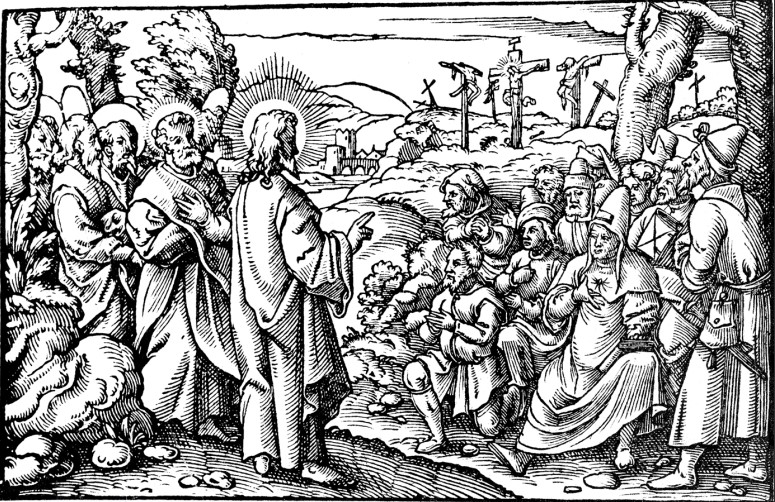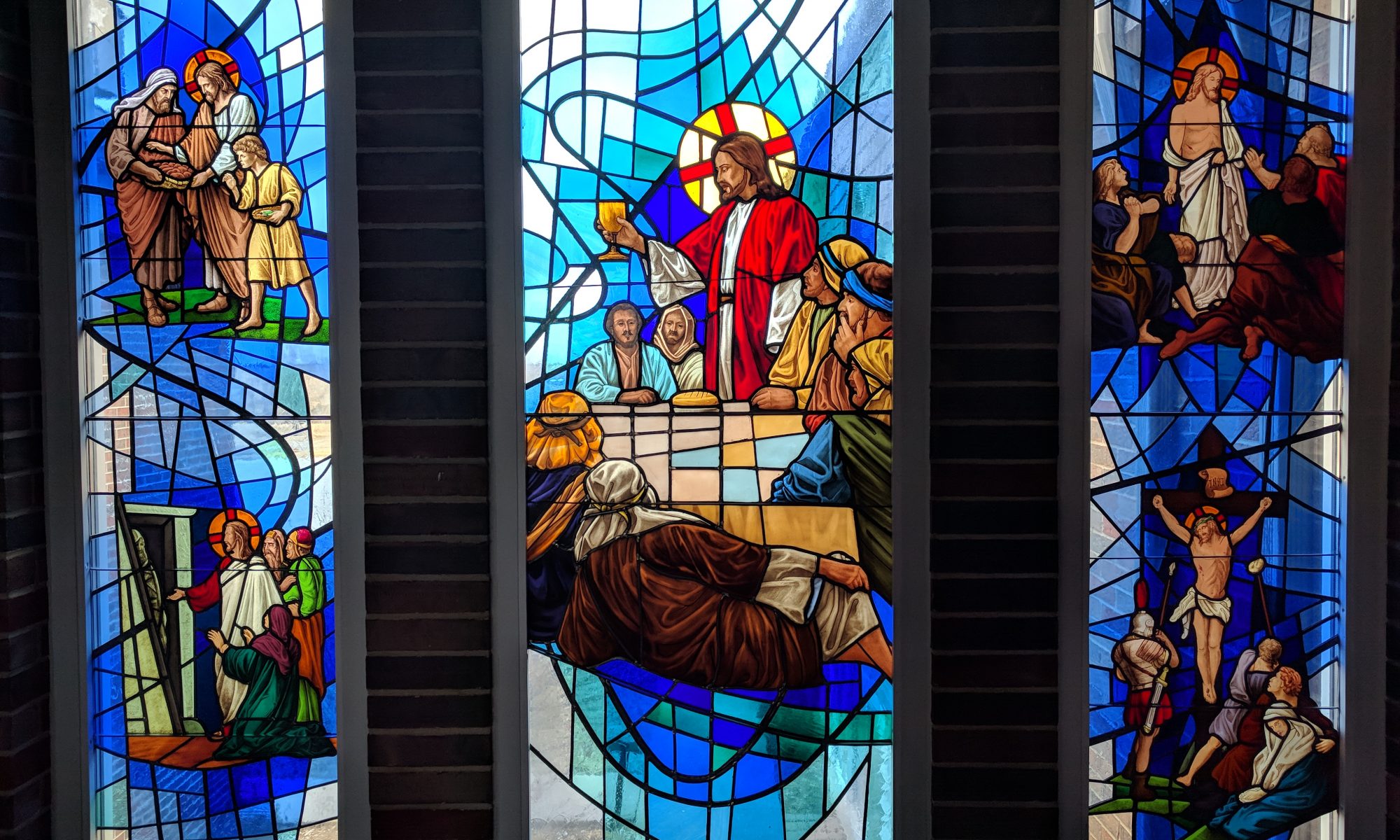
Lessons: Ezekiel 36:22–28, 1 Peter 4:7–14, John 15:26—16:4
Hymns: LSB 465, 553, 621, 490, 768
Grace, mercy, and peace to you from God our Father and our Lord and Savior, Jesus Christ. Amen.
The context for today’s Gospel is the same as what we’ve heard the last several weeks. Jesus is giving a long speech to His disciples on Maundy Thursday before they go to the Garden of Gethsemane where Jesus is betrayed and arrested. Jesus is preparing the apostles for things to come. In today’s Gospel, the focus is twofold: Jesus is sending the Holy Spirit who will bear witness of Him and Jesus is alerting the disciples of the persecution they will face for bearing witness of Christ.
These are fitting themes for us to consider on this Sunday—the final Sunday of Easter before Pentecost, and the only Sunday that falls between the Ascension of our Lord and the Feast of Pentecost.
Before our Lord ascended into Heaven, He told the disciples to wait in Jerusalem because they will soon receive the Holy Spirit. Just ten days after His ascension, the Holy Spirit came. Their waiting time was short, yet in a sense, their waiting continued. Yes, the Holy Spirit came, but Jesus did not return in their lifetimes. And, while we enjoy the blessings from the coming of the Holy Spirit, we also are waiting. We are waiting for the return of our Lord Jesus Christ when He comes in power and glory on the Last Day. In our Epistle, St. Peter anticipates the return of Christ, saying, “The end of all things is at hand.” Yet Peter wrote those words over 1900 years ago! And his words remain true: “The end of all things is at hand.” We are living in the end times, for we are anticipating the return of Jesus for judgment and the New Creation.
St. Peter was taught by Christ for three years. St. Peter was there on Maundy Thursday. St. Peter received the Holy Spirit at Pentecost, expounding the Scriptures and proclaiming Christ’s death and resurrection. Guided by that same Spirit, St. Peter wrote of the fiery trials that God’s people will face on account of their faith as they live in the end times. He teaches us not to be surprised by them, for they are to test us. And He calls on us to rejoice whenever we share in Christ’s sufferings, that we may also be glad when Jesus’ glory is revealed on the Last Day. He even says we will be blessed if we are insulted for the name of Christ, for the Spirit of glory rests upon us (1 Peter 4:7-14).
These words sound very strange to many Christians. Many Christian preachers conveniently skip over passages like these, for suffering and persecution do not fit their narrative. They want you to believe that being a Christian means you can enjoy a happy-go-lucky life filled with material abundance. Some do so because they’re getting rich, leading you to believe that if you give to God by giving money to their ministry, then they claim God will give back to you tenfold. So if you give their ministry $100, you’ll get back $1,000. Imagine if that were true. All Christians could quickly become filthy rich. But Jesus didn’t die on the cross so that we can diminish Christianity to material wealth. Jesus was not sacrificed so we can fatten ourselves with pleasure and give in to all our carnal desires. Christ did come so that our hope in Him is reduced to ease of life, wealth, gluttony, or fleshly passions. And plus, it is easier for a camel to go through the eye of a needle than for a rich man to enter the kingdom of God (Matt. 19:24).
We do live in a time of waiting. We anticipate the return of Christ. In the Creed, we confess that we “look for the resurrection of the dead and the life of the world to come.” Our minds and hearts look beyond the fleeting things of the world around us and toward the coming glories we shall receive at the Resurrection of all flesh. Our eyes are fixed on Jesus, the author and perfector of our faith, who saved us through His bitter sufferings and death.
The apostles, upon receiving the Holy Spirit at Pentecost, went everywhere to spread the Good News that Jesus of Nazareth is the Christ who is crucified; He has been raised from the dead. They entered synagogues on the Sabbath to tell those who are anticipating the coming Messiah that He has indeed come. They told many of the life and works of Christ. They announced that salvation is secured by Jesus alone, that He has overcome death and the grave, He earned forgiveness of sins to all who call upon Him, and that Jesus is now seated in Heaven as our King and great High Priest.
Many rejoiced at this good news. Many heard this message and believed it. But others rejected the message of the apostles. In doing so, they rejected Christ. Jesus told the apostles that they will be put out of the synagogues, and those who kill them will think they are offering God service. Most of the apostles were martyred—put to death for faithfully proclaiming Christ’s Advent. It’s interesting that in verse 27 of our Gospel, Jesus said to the apostles, “You will bear witness.” Then He says they will be killed. The Greek word witness is μαρτυρέω where we get the word martyr. For some, witnessing Christ led to martyrdom.
Those who put Christians to death think they’re doing the right thing. As Jesus prophesied, they think they’re doing God service. They think they’re fighting on God’s behalf. Many today think they are doing God service when they also persecute true Christianity. It’s easy to pick on Muslims who believe their cause of killing infidels (that is, non-Muslims) is a holy work. But Jesus is talking about those who think they are offering Him service when they kill Christians. In the Church, we need to remember the martyrs. They serve for us as great examples of faith. Their examples can strengthen us as we face opposition or challenges for being Christian. Christian teachers are often forced to check their faith out the door when they enter schools. Christians in the workplace are forced to acknowledge desired pronouns instead of how God created individuals—male and female He created them. Christian parents are told they must forfeit the Divine Service to allow their children to remain on the sports team. As Christians, we don’t cave in to all these societal trends. Instead, we fight the good fight of faith, contending for the truth of God’s Word.
The first men to die for their belief in the teachings of the Lutheran Reformation were Jan van Essen and Hendrik Vos in Brussels, Belgium. We are coming up on the 500th anniversary of their martyrdom—on July 1, 1523. It started when a monastery in Antwerp learned of the teachings of the Reformation and all the monks there agreed that these teachings are true. But when they learned that they risked being burned alive for adopting Lutheran beliefs, all but three recanted. One ended up in prison until his death and the other two were burned at the stake. Normally the charges against them are read prior to their execution, but in this case that was not done. It could have been that the Roman Catholic Church feared more people would be converted if the faith of these two men is revealed in their charges. This event brought much grief to Martin Luther, but it also resulted in the writing of his first ballad, “A New Song Now Shall Be Begun” and he would go on to write nearly 40 more hymns and ballads.
We live in a time and land where martyrdom is rare. But there are places across the globe where it is incredibly dangerous to be a Christian and where severe persecution or martyrdom are not uncommon. Not a day goes by where Christians aren’t jailed or tortured. Some are maimed, abducted, molested, or even executed. We need to be praying for the persecuted. The faithful will not renounce their faith as they suffer, for they would rather die confessing Christ than extend their earthly lives by renouncing the very One who bled and died for their salvation.
What many of our persecuted brethren would do to have just once what we enjoy ever so peacefully every week in this house of God!
Meanwhile, we think we’re being tortured when the Church suggests giving a tithe of our income, or when we are taught to go to Church every Sunday, sing boldly, listen intently to the Word, attend Bible study, or learn Bible passages by heart. Put this way, we certainly deserve a famine of God’s Word. But thankfully God grants us far more than we ask or think, even showering His grace upon us when we are ungrateful.
This past Thursday was Ascension Day. In the Gospel reading from Mark, Jesus rebuked the disciples’ hardness of heart and unbelief, because they did not believe those who had seen that Jesus had risen from the dead. Yet, He then instructed them to go into all the world and proclaim the saving Gospel (Mark 16:14-16). After Jesus rebuked them, He told them to do the very opposite of what they are doing. Instead of unbelieving with hard hearts, He told them to go and boldly proclaim the resurrection of Christ!
In the same way, instead of God punishing us with death for our timidity or laziness in Christian growth, Jesus still forgives, still keeps the Word in our midst, still counts us as His redeemed children, still hears our prayers, and still has a place prepared for us in Paradise. We receive these blessings because we are saved not by our good works, but by grace. Our failures do not result in condemnation; instead, Jesus forgives our sins and cleanses us of all unrighteousness as we Christians repent.
Jesus warned the apostles of the suffering they will face. But He also strengthened them by sending the Holy Spirit who guided them into all the Truth. That same Spirit is at work today, guiding us and blessing us through the Word of God. Christ Jesus was crucified to take away our sin and grant us life. He teaches that we servants are not above our Master (Matt. 10:16-33). Jesus suffered, and so shall we in this life. But, He has not left us alone. He is our Immanuel, the Good Shepherd. He laid down His life to grant us everlasting life. Because He lives, we too shall live and join Him in the gates of Paradise. And so we do not lose heart. We keep focus on the blessings we have in Christ. We lay hold of His forgiveness and receive the salvation He brings. Amen.
The peace of God which passes all understanding keep your hearts and minds in Christ Jesus to life everlasting. Amen + Soli Deo Gloria +

